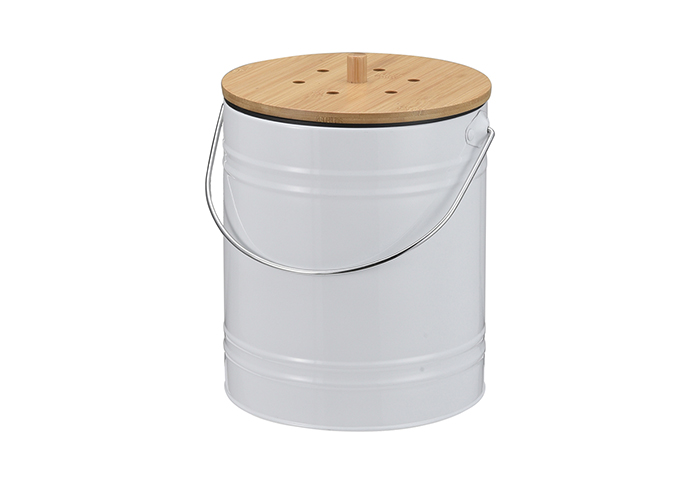Advantages of compost bin?
Compost bins, often hailed as the unsung heroes of eco-friendly living, are transformative tools that turn kitchen and garden waste into nutrient-rich compost. Beyond being a solution for waste reduction, compost bins offer a multitude of advantages that contribute to sustainable practices, soil health, and a more mindful approach to consumption. In this comprehensive guide, we delve into the multifaceted benefits of compost bins, shedding light on their impact on environmental conservation, gardening, and the overall promotion of a circular economy. Learn more about What is a Compost Bin?

Advantages of Compost Bins:
-
Waste Reduction and Diversion: One of the primary advantages of compost bins is their role in waste reduction and diversion from landfills. By diverting kitchen scraps, yard waste, and other compostable materials from traditional waste streams, these bins contribute to the reduction of landfill waste and associated environmental impacts.
-
Nutrient-Rich Soil Amendment: Compost bins produce nutrient-rich compost, often referred to as "black gold." This organic matter serves as a valuable soil amendment, enhancing soil structure, moisture retention, and nutrient content. The resulting compost is a natural fertilizer that promotes healthier plant growth and overall soil health.
-
Reduction of Greenhouse Gas Emissions: Composting organic waste in a controlled environment, such as a compost bin, reduces the production of methane gas—a potent greenhouse gas associated with traditional landfill decomposition. Composting, in contrast, allows for the aerobic breakdown of organic matter, mitigating the release of harmful gases into the atmosphere.
-
Cost-Effective Soil Enrichment: Compost generated from compost bins serves as a cost-effective alternative to commercial fertilizers. By enriching the soil with homemade compost, gardeners can reduce their reliance on store-bought fertilizers, leading to financial savings and a more sustainable gardening approach.
-
Improved Water Retention and Soil Structure: The organic matter in compost improves soil structure, enhancing its ability to retain water. This is particularly beneficial in both clayey and sandy soils, as compost helps clay soils drain more effectively and sandy soils retain moisture, creating a balanced and fertile growing environment.
-
Encouragement of Sustainable Practices: Compost bins encourage sustainable living practices by promoting the mindful disposal of organic waste. Individuals using compost bins are more likely to adopt environmentally conscious habits, such as reducing food waste, choosing compostable materials, and actively participating in the circular economy.
-
Biodiversity and Soil Microbial Activity: Compost promotes biodiversity and encourages the activity of beneficial microorganisms in the soil. The diverse array of nutrients in compost attracts a range of soil organisms, including bacteria, fungi, and earthworms, fostering a healthy and vibrant soil ecosystem.
-
pH Regulation in Soil: Compost acts as a natural buffer, helping regulate soil pH. This is especially valuable in areas where soil acidity or alkalinity is a concern. Compost tends to neutralize extremes in pH, creating an optimal environment for plant growth.
-
Reduction of Chemical Dependency: Utilizing compost from compost bins reduces the dependency on chemical fertilizers and pesticides. The natural nutrients and microbial activity in compost contribute to pest resistance and overall plant health, minimizing the need for synthetic inputs that can have adverse environmental effects.
-
Community and Educational Benefits: Compost bins can serve as educational tools within communities. Community composting initiatives and educational programs can raise awareness about the benefits of composting, waste reduction, and sustainable living, fostering a sense of environmental responsibility among residents.
-
Creation of Closed Nutrient Cycles: Compost bins contribute to closed nutrient cycles in local ecosystems. By recycling organic matter back into the soil, composting completes the cycle of nutrient uptake by plants, organic material decomposition, and subsequent nutrient release, creating a sustainable and self-sufficient ecosystem.
-
Odor Control and Pest Management: Compost bins, when properly managed, control odors associated with decomposing organic matter. Additionally, well-aerated compost piles deter pests such as rodents and insects. This ensures a pleasant composting experience while minimizing the risk of attracting unwanted creatures.
-
Support for Sustainable Agriculture: Compost generated from compost bins supports sustainable agricultural practices. Organic farmers and gardeners value compost for its ability to enhance soil fertility without relying on synthetic chemicals, contributing to the broader movement toward sustainable and regenerative agriculture.
-
Mitigation of Soil Erosion: Compost improves soil structure and stability, mitigating the risk of soil erosion. The organic matter in compost helps bind soil particles together, preventing erosion caused by wind or water runoff. This is particularly beneficial in areas prone to erosion.
-
Contributions to Local Ecosystems: Compost bins contribute to local ecosystems by enhancing soil health and biodiversity. As compost-enriched soil supports a diverse array of plants and organisms, it indirectly benefits local wildlife, creating a harmonious and ecologically balanced environment.
Conclusion:
Compost bins stand as powerful tools in the journey toward sustainable living, offering benefits that extend far beyond waste reduction. From nurturing nutrient-rich soil to promoting biodiversity and supporting local ecosystems, compost bins embody the principles of circular economy and responsible environmental stewardship. As individuals and communities increasingly recognize the importance of sustainable practices, compost bins emerge as key players in fostering a healthier planet one compost heap at a time.
